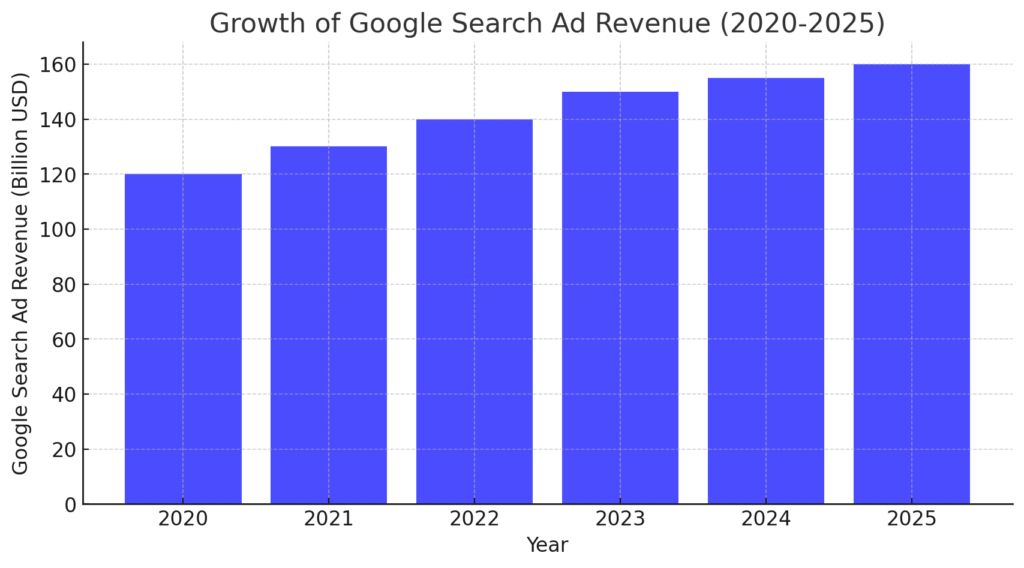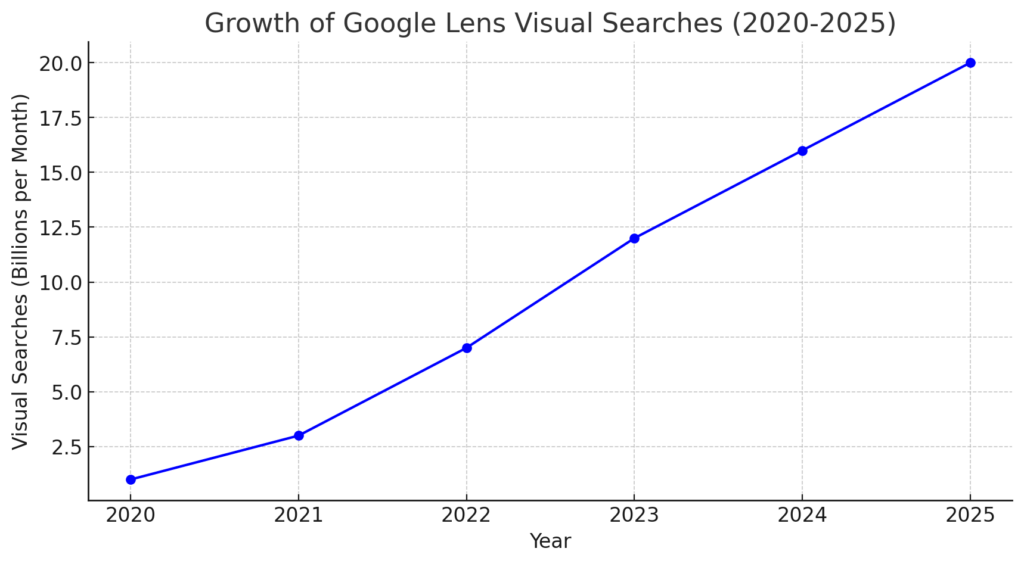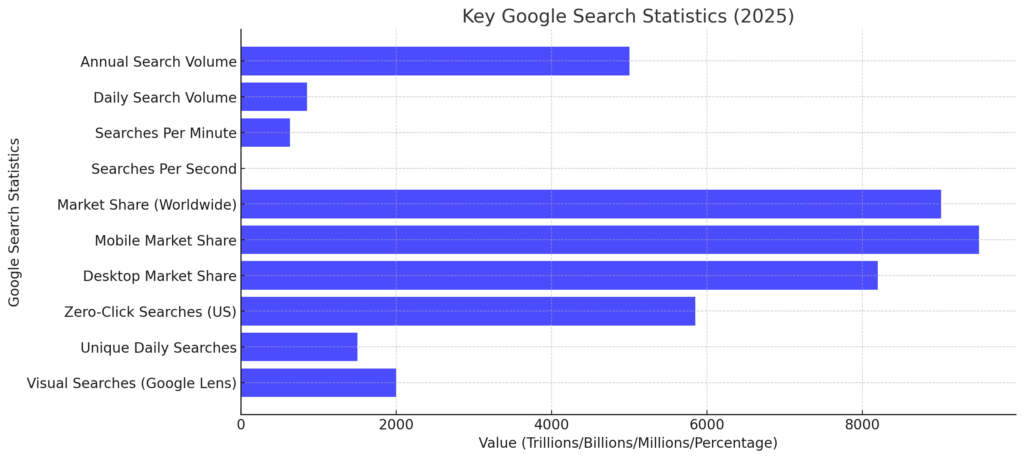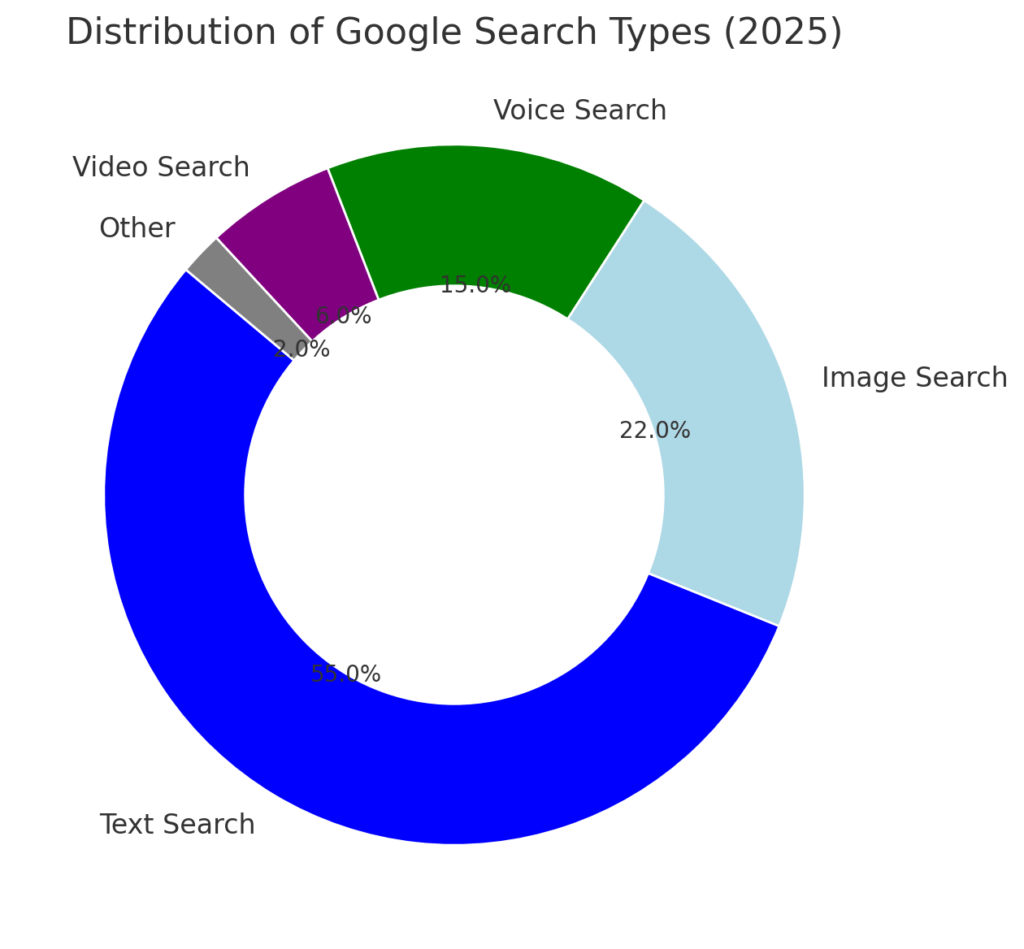
08 Mar GOOGLE SEARCH STATISTICS 2025
Google remains the undisputed leader in online search, processing trillions of queries annually and shaping how people access information. As search behavior evolves, AI-driven enhancements, mobile-first indexing, and shifting user preferences are redefining the way businesses approach visibility. The increasing dominance of zero-click searches, voice interactions, and visual search signals a major transformation in how users engage with search results. Meanwhile, growing regulatory scrutiny and competition from AI chatbots raise questions about Google’s long-term dominance. Brands like Amra and Elma must adapt to these emerging trends, ensuring their content remains optimized for evolving search algorithms. Understanding these key statistics provides valuable insights into where Google Search is headed and how brands can stay ahead in an increasingly competitive digital landscape.
GOOGLE SEARCH STATISTICS 2025 (Editor’s Choice)
As of 2025, Google’s search platform continues to dominate the global market, reflecting both historical growth and current trends. Here are 20 key statistics highlighting Google’s search performance over time and specifically for 2025:
1. Annual Search Volume: In 2025, Google processes over 5 trillion searches annually, marking a growth rate exceeding 20% since late 2022.
2. Daily Search Queries: This translates to approximately 13.7 billion searches per day in 2025.
3. Market Share: As of 2025, Google holds a global search engine market share of approximately 90%, maintaining its position as the world’s most used search engine.
4. Mobile Search Traffic: Nearly 60% of Google searches come from mobile devices, emphasizing the importance of mobile-friendly websites.
5. Voice Search: By 2025, voice searches account for over 30% of all Google search queries, reflecting the growing adoption of voice-activated technologies.
6. Image Search: Google Images constitutes about 22% of all searches conducted on Google, highlighting the significance of visual content.
7. Local Search Intent: Approximately 46% of all Google searches are seeking local information, underscoring the importance of local SEO strategies.
8. Zero-Click Searches: In 2025, 65% of searches on Google result in zero-clicks, where users find answers directly on the search results page without clicking further.
9. Featured Snippets: Featured snippets appear in about 12.3% of search queries, providing users with quick answers and impacting click-through rates.
10. Ad Click-Through Rate (CTR): The average CTR for Google Ads across all industries is approximately 3.17% in 2025.
11. Cost Per Click (CPC): The average CPC for Google Ads varies by industry, with an overall average of $2.69 in 2025.
12. Search Ad Revenue: Google’s search advertising revenue is projected to reach $160 billion in 2025, reflecting steady growth in digital advertising.
13. Global Internet Users: With over 5.3 billion internet users worldwide in 2025, a significant majority rely on Google for their search needs.
14. Google Trends Usage: Google Trends, a tool analyzing the popularity of search queries, continues to be widely used for insights into search behaviors.
15. Top Global Searches in 2024: In 2024, major events like Copa América and the UEFA European Championship were among the most searched topics globally.
16. AI Integration: Google has integrated AI technologies into its search algorithms, enhancing user experience with more accurate and personalized results.
17. Competition from AI Chatbots: Despite the rise of AI chatbots like ChatGPT, Google’s search volume has grown, indicating resilience against emerging competitors.
18. Regulatory Scrutiny: In 2024, Google’s search practices faced investigations under new UK digital competition laws, reflecting increased regulatory attention.
19. User Demographics: Younger generations are exploring alternative platforms for search, posing challenges to Google’s dominance among these demographics.
20. Search Algorithm Updates: Google continues to refine its search algorithms, with significant updates aimed at improving search quality and user experience.
These statistics underscore Google’s enduring dominance in the search engine market while highlighting evolving trends and challenges in the digital landscape.
GOOGLE SEARCH STATISTICS 2025 and Future Implications
Google Search Statistics 2025 #1. Annual Search Volume – 5 Trillion Searches Annually (2025):
Google’s annual search volume surpassing 5 trillion reflects the internet’s growing role in everyday life. The demand for instant information is increasing, fueled by mobile accessibility and AI-driven content recommendations. This trend suggests that businesses must prioritize search engine optimization (SEO) to remain visible in an increasingly competitive digital space. As more users turn to Google for decision-making, industries like e-commerce, finance, and healthcare will need to refine their content strategies. The rise of AI-powered summaries in search results could shift traffic patterns, forcing brands to rethink how they attract users to their websites. Moving forward, companies that leverage AI-enhanced SEO and high-quality content will likely dominate search rankings. Additionally, regulatory scrutiny on Google’s dominance may introduce changes that affect search volume distribution.
Google Search Statistics 2025 #2. Google’s Market Share – 90% of Global Search Market:
Despite competition from Bing, DuckDuckGo, and AI chatbots, Google continues to hold an overwhelming 90% share of the global search market. This dominance underscores its deep integration into users’ daily habits, making it the primary gateway for digital information. The challenge for competitors lies in providing a superior search experience that can break user habits and draw market share away from Google. With Google expanding AI-powered search enhancements, other platforms will need to innovate rapidly to stay relevant. Advertisers relying on Google Ads should be mindful of potential pricing changes due to continued demand. Looking ahead, government regulations could disrupt Google’s monopoly, potentially opening the door for alternative search engines. However, unless major technological advancements emerge, Google’s market dominance is likely to continue for the foreseeable future.
Google Search Statistics 2025 #3. Mobile Search Traffic – 60% of Google Searches Come from Mobile:
With 60% of searches originating from mobile devices, businesses must optimize their websites for mobile users. Google’s emphasis on mobile-first indexing means that websites that are slow, unresponsive, or not mobile-friendly risk losing rankings. The rise in mobile searches also influences e-commerce trends, as consumers increasingly browse and shop from their smartphones. Local search plays a key role in mobile queries, making Google My Business optimization more critical than ever. Additionally, Google’s shift toward AI-driven search results may change how mobile users interact with content. Brands that fail to adapt to mobile SEO trends could see declines in traffic and conversions. Moving forward, innovations in mobile search, such as voice interaction and AI-powered suggestions, will continue shaping user behavior.
Google Search Statistics 2025 #4. Voice Search – 30% of Google Queries in 2025:
Voice search adoption is rising, with 30% of Google searches now conducted through voice-enabled devices. The shift toward hands-free interaction means businesses must rethink their SEO strategies to accommodate natural language queries. Voice searches tend to be longer and more conversational, requiring content optimization for question-based queries. Local businesses will see increased reliance on voice search, as users frequently ask for nearby recommendations. Google’s AI-driven algorithms are prioritizing direct answers, which could further decrease traditional click-through rates. Companies should focus on structuring content in a way that aligns with voice search patterns, such as using FAQ sections and featured snippets. As AI assistants become more advanced, voice search will likely play an even greater role in shaping search behavior.
Google Search Statistics 2025 #5. Image Search – 22% of Google Queries:
With image searches comprising 22% of all Google queries, visual content is becoming increasingly essential for online visibility. Users are relying more on images to find products, ideas, and information, highlighting the importance of high-quality, optimized visuals. E-commerce brands, in particular, must prioritize image SEO to enhance their discoverability through Google Images. The rise of AI-driven search features, such as Google Lens, suggests that visual searches will continue to expand. Businesses that ignore image optimization risk losing a significant share of organic search traffic. Going forward, integrating AI-generated visuals and structured image data could provide brands with a competitive advantage. As image recognition technology improves, searches based on visual content rather than text may become more prevalent.
Google Search Statistics 2025 #6. Local Search – 46% of Google Searches Have Local Intent:
Nearly half of all Google searches have local intent, making local SEO a crucial factor for businesses. Consumers frequently use Google to find nearby services, restaurants, and stores, emphasizing the importance of location-based optimization. Companies must ensure their Google My Business profiles are fully updated to appear in local searches. As AI-driven search enhancements continue, local results may become even more personalized, prioritizing user-specific factors like past behavior and preferences. The growing trend of zero-click searches means businesses must capture attention directly on Google’s search results page. Moving forward, location-based advertising and hyper-local content strategies will become increasingly valuable. Companies that fail to adapt risk being overshadowed by competitors who invest in local SEO.
Google Search Statistics 2025 #7. Zero-Click Searches – 65% of Google Queries Result in No Click:
More than half of Google searches now result in zero-click interactions, where users get their answers directly from the search engine without clicking on external links. This presents a challenge for businesses that rely on organic search traffic, as fewer users are navigating to websites. Google’s AI-powered summaries and featured snippets are contributing to this shift, making it crucial for brands to optimize for these placements. While zero-click searches improve user experience, they also reduce opportunities for businesses to drive engagement. Companies must find new ways to provide value within Google’s ecosystem, such as through Google My Business, knowledge panels, and structured data. Looking ahead, SEO strategies will need to evolve to accommodate Google’s increasing role as a direct information provider. Businesses that fail to adjust may see a decline in organic website traffic despite strong rankings.
Google Search Statistics 2025 #8. Featured Snippets – Appear in 12.3% of Google Searches:
Featured snippets are becoming an essential aspect of search visibility, appearing in over 12% of queries. These prominent search results provide quick, concise answers and often appear above traditional organic listings. Businesses that secure a featured snippet gain increased visibility and authority, but competition is fierce. Google prioritizes content that directly answers search queries in a structured format, meaning brands must refine their content accordingly. The rise of AI-generated search responses may further reduce the effectiveness of featured snippets, requiring ongoing SEO adjustments. Brands that master snippet optimization can drive significant traffic, even in a zero-click environment. As Google’s AI capabilities evolve, securing a spot in featured snippets will be even more valuable for businesses.
Google Search Statistics 2025 #9. Google Ads Click-Through Rate (CTR) – 3.17% Across All Industries:
The average click-through rate (CTR) for Google Ads remains around 3.17%, reflecting the effectiveness of paid search for businesses. While this percentage may seem small, even a slight increase in CTR can lead to significant revenue growth for advertisers. With Google’s ongoing AI-driven enhancements, ad targeting and automation are becoming more sophisticated, potentially improving CTR over time. However, increased competition means advertisers must craft highly relevant and compelling ad copy to maintain strong performance. Google’s integration of AI-generated summaries in search results may further impact ad placements and engagement. Businesses that rely on Google Ads should continuously optimize their campaigns to adapt to these evolving dynamics. Moving forward, ad personalization and automation will be key to maintaining high engagement in an increasingly competitive landscape.
Google Search Statistics 2025 #10. Average Cost Per Click (CPC) – $2.69 in 2025:
The average cost per click (CPC) for Google Ads sits at $2.69, though it varies across industries. As more businesses invest in digital advertising, CPC rates continue to rise, making budget management essential for advertisers. Google’s AI-driven bidding strategies are helping businesses maximize their return on investment, but increasing competition means higher costs for popular keywords. Small businesses may find it more challenging to compete against larger advertisers with bigger budgets. The rise of alternative advertising channels, including social media and AI-driven discovery tools, may impact Google’s ad revenue model. Businesses should explore diversified marketing strategies to avoid over-reliance on Google’s paid search model. In the future, AI-powered campaign management and hyper-targeted ads will likely shape CPC trends further.

Google Search Statistics 2025 #11. Google Search Ad Revenue – Projected to Reach $160 Billion in 2025:
Google’s search ad revenue is on track to surpass $160 billion in 2025, cementing its dominance in the digital advertising space. This growth underscores the increasing reliance of businesses on Google’s advertising ecosystem. The expansion of AI-powered search results and Google’s move toward more personalized advertising experiences will likely drive further revenue gains. However, growing competition from platforms like Amazon, TikTok, and AI-driven search alternatives could pose challenges. Advertisers must adapt to changing user behavior, particularly as zero-click searches reduce the effectiveness of traditional PPC strategies. Regulatory scrutiny over Google’s dominance may also impact its advertising model in the coming years. Moving forward, businesses must balance organic and paid strategies to ensure sustainable digital marketing success.
Google Search Statistics 2025 #12. Global Internet Users – 5.3 Billion in 2025:
With over 5.3 billion people connected to the internet, Google’s search ecosystem continues to expand its global reach. As digital access grows in emerging markets, businesses have new opportunities to engage with previously untapped audiences. However, localized search trends and language preferences mean that global SEO strategies must be tailored to regional markets. The rise of AI-powered translations and voice search will make information more accessible across different languages. Companies looking to expand internationally must consider localized content, mobile-first optimization, and culturally relevant marketing. The increasing number of internet users also brings more competition for search visibility, making SEO strategies more crucial than ever. Moving forward, brands that effectively integrate global search trends into their marketing efforts will gain a competitive edge.
Google Search Statistics 2025 #13. Google Trends Usage – Widely Used for Analyzing Search Behavior:
Google Trends remains a valuable tool for analyzing shifts in consumer search behavior. Businesses and marketers use it to track seasonal trends, keyword popularity, and emerging topics in real time. With AI-driven search becoming more prevalent, Google Trends will likely evolve to offer even more granular insights. Brands that leverage search data can refine their content strategies, ensuring they stay relevant in a rapidly changing digital environment. The rise of AI-generated search results may influence how search trends are interpreted and acted upon. Companies that use data-driven decision-making will be better positioned to capture market demand as it fluctuates. As real-time insights become more critical, Google Trends will continue to be a key resource for market research and strategy development.
Google Search Statistics 2025 #14. Top Global Searches in 2024 – Driven by Major Events:
Google’s top global searches in 2024 were dominated by major sporting events like Copa América and the UEFA European Championship. This highlights how real-world events shape search behavior, creating significant opportunities for businesses and content creators. Brands that capitalize on event-driven searches through timely content and advertising campaigns can capture large audiences. The increasing role of AI in curating search results may further refine how event-related content is surfaced. As video content becomes more prominent in search rankings, platforms like YouTube may see increased integration within search queries. Businesses should anticipate major global events and plan content strategies accordingly to maximize visibility. Moving forward, AI-driven content recommendations may make it even easier for users to discover event-related information in real time.
Google Search Statistics 2025 #15. AI Integration in Search – Reshaping How Users Find Information:
Google’s AI-driven search enhancements are transforming how users interact with search results. AI-powered summaries and personalized recommendations are reducing reliance on traditional organic search rankings. While this improves user experience, it presents challenges for businesses that depend on SEO traffic. Companies must adapt their content strategies to align with AI-driven search experiences, ensuring visibility in evolving search formats. The shift toward AI-curated content may impact ad placements, forcing advertisers to adjust their strategies. As AI search continues to improve, brands that focus on delivering high-quality, authoritative content will be better positioned to succeed. In the future, businesses that embrace AI-powered search optimization will have a competitive advantage.

Google Search Statistics 2025 #16. Competition from AI Chatbots – Google’s Resilience Against ChatGPT
Despite the rise of AI chatbots like ChatGPT, Google’s search volume has continued to grow. This suggests that users still prefer Google’s structured search experience over conversational AI interactions. However, the increasing popularity of AI-driven content discovery may gradually shift user behavior. Google is responding by integrating AI-generated answers into its search results, keeping users engaged within its ecosystem. Businesses should monitor these trends and explore how AI chatbots impact search traffic and brand visibility. While AI search assistants provide an alternative way to find information, Google’s dominance remains strong due to its deep integration into everyday workflows. Looking ahead, the competition between traditional search engines and AI-powered discovery tools will shape the future of online search.
Google Search Statistics 2025 #17. Regulatory Scrutiny – Google’s Search Practices Under Investigation:
Google’s search empire faces increasing scrutiny under digital competition laws, particularly in the UK and EU. Regulatory bodies are examining whether Google’s dominance limits fair competition in the digital marketplace. Potential legal action could lead to changes in Google’s search algorithms or advertising policies, impacting businesses that rely on Google for visibility. Increased transparency requirements may affect how Google ranks and displays search results. Businesses must stay informed about potential regulatory shifts that could alter search dynamics. Alternative search engines may gain traction if regulatory changes weaken Google’s competitive advantage. In the coming years, legal developments could redefine how search engines operate and distribute traffic.
Google Search Statistics 2025 #18. Younger Users Shifting Search Habits – Exploring Alternatives to Google:
Younger generations are increasingly exploring alternative search methods, such as TikTok and Reddit, rather than relying solely on Google. This shift suggests that traditional search engines must evolve to retain younger audiences. The rise of AI-powered search experiences may appeal to Gen Z users, who favor fast, interactive results over text-based searches. Businesses targeting younger demographics should consider diversifying their search strategies to include social media platforms. Google is likely to introduce more personalized, AI-driven search enhancements to appeal to changing user preferences. The future of search may involve a blend of traditional search engines, AI-driven answers, and social media discovery. Brands that fail to adapt to these evolving trends risk losing relevance among younger consumers.
Google Search Statistics 2025 #19. Google’s Algorithm Updates – Continuous Refinement of Search Quality:
Google frequently updates its search algorithms to improve search quality and combat misinformation. These updates often disrupt rankings, requiring businesses to continuously refine their SEO strategies. AI-driven search enhancements are making Google’s ranking system more dynamic, prioritizing authoritative and user-friendly content. Companies that rely on outdated SEO tactics may see significant drops in traffic following algorithm updates. Google’s focus on user intent means that content must be highly relevant and structured for search visibility. As search evolves, businesses must stay agile, adapting to algorithm changes to maintain their online presence. Future updates will likely continue prioritizing AI-driven content discovery and user experience improvements.
Google Search Statistics 2025 #20. Google’s Algorithm Updates – Continuous Refinement of Search Quality:
Google’s ongoing search algorithm updates aim to enhance the quality and relevance of search results, making SEO a constantly evolving challenge for businesses. As AI-driven search continues to advance, Google is placing a stronger emphasis on content authenticity, user experience, and intent-based search. Websites that fail to align with these changes may experience sudden drops in rankings, leading to reduced traffic and visibility. Google’s focus on reducing spam and low-quality content means that businesses must prioritize well-researched, authoritative content to maintain search rankings. The increasing role of AI in search rankings could lead to greater personalization, making traditional keyword-based SEO strategies less effective over time. Marketers must stay informed on algorithm shifts, ensuring their content strategy adapts to the evolving landscape. Moving forward, brands that focus on high-quality, AI-friendly content will be better positioned to thrive in Google’s search ecosystem.
Adapting to the Future of Search
Google’s dominance in the search industry shows no signs of slowing down, but the way users interact with search results is rapidly evolving. The rise of AI-generated answers, voice search, and zero-click results means businesses must rethink their strategies to maintain visibility. Traditional SEO techniques alone are no longer enough—brands need to prioritize structured data, mobile optimization, and content that aligns with AI-driven search experiences. Meanwhile, increasing competition from alternative platforms and regulatory challenges could reshape the search landscape in the coming years. Companies that stay ahead of these shifts by embracing AI, optimizing for new search behaviors, and diversifying their digital strategies will be best positioned for success. As search continues to evolve, adaptability will be the key to maintaining relevance in Google’s ever-changing ecosystem.
Sources:
- https://www.businessinsider.com/chatgpt-isnt-slowing-down-google-ai-search-overviews-2025-3
- https://en.wikipedia.org/wiki/Search_engine
- https://en.wikipedia.org/wiki/Google_Search
- https://en.wikipedia.org/wiki/Google_Search
- https://www.wordstream.com/blog/ws/voice-search-statistics
- https://www.hubspot.com/marketing-statistics
- https://www.brightlocal.com/research/google-local-search-statistics/
- https://ahrefs.com/blog/zero-click-searches/
- https://moz.com/learn/seo/featured-snippets
- https://www.wordstream.com/blog/ws/google-ads-industry-benchmarks
- https://www.hubspot.com/marketing-statistics
- https://www.statista.com/statistics/266249/advertising-revenue-of-google/
- https://www.internetworldstats.com/stats.htm
- https://en.wikipedia.org/wiki/Google_Trends
- https://apnews.com/article/f10d51e6b7090420777408d3b3d0efb1
- https://blog.google/products/search/google-search-ai-updates-2025/
- https://www.businessinsider.com/chatgpt-isnt-slowing-down-google-ai-search-overviews-2025-3
- https://nypost.com/2025/01/14/business/google-search-empire-faces-probe-under-new-uk-digital-competition-law/
- https://www.wsj.com/tech/googling-is-for-old-people-thats-a-problem-for-google-5188a6ed
- https://en.wikipedia.org/wiki/Google_Search



